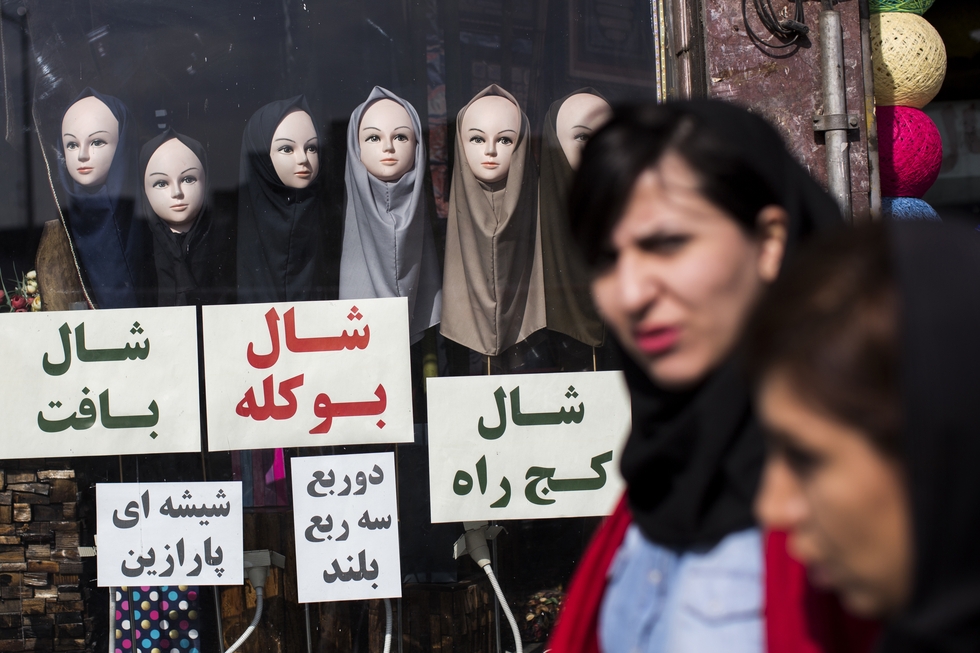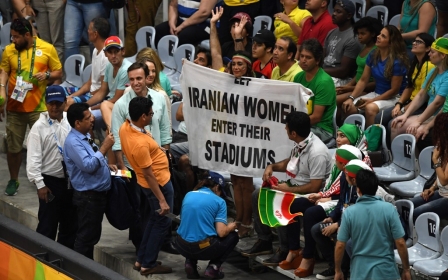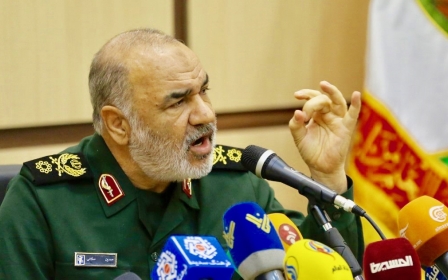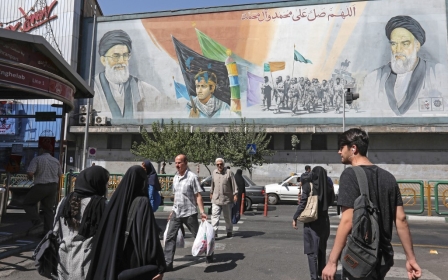Iranian press review: Death of ‘blue girl’ sparks outrage

The death of female football fan Sahar Khodayari on Monday has sparked fury in Iran. Known as the "blue girl" for her support of her club Esteghal, the 29-year-old set herself on fire last week outside a courthouse.
In March, Khodayari was arrested for attempting to enter Tehran’s Azadi stadium disguised as a man to watch one of Esteghlal’s matches. She was kept in custody for three days and was then released on bail after being told that she would be prosecuted.
One of her sisters said that Khodayari suffered from bipolar disorder and had set herself on fire after she heard last week that her sentence could be a prison term of six months to two years.
Her death has sparked anger in Iran about the ban on Iranian women accessing stadiums during football matches.
In a tweet responding to Khodayari’s death, Iranian MP Parvaneh Salahshouri condemned Iran’s patriarchal society:
New MEE newsletter: Jerusalem Dispatch
Sign up to get the latest insights and analysis on Israel-Palestine, alongside Turkey Unpacked and other MEE newsletters
“She was not only the Blue Girl, Sahar was a daughter of Iran, where its men tell women what to do and deprive them from their basic human rights,” Salahshouri wrote on Twitter. “We are all responsible for the imprisonment and the burning of all Iranian Sahars.”
Farhad Majidi, a famous former footballer of Esteghlal football team, wrote on Instagram: “Dear Sahar, the seats of Azadi [Stadium] will forever carry the regret of not seeing you.”
Iranian women are not allowed to enter stadiums to watch men’s football matches. In recent years, activists have organised campaigns trying to overturn the ban. However, so far women have only been allowed to enter stadiums during a few national matches.
IRGC chief dismisses US talks
The head of Iran’s Islamic Revolutionary Guard Corps (IRGC) has claimed that the US has rowed back on its preconditions for talks, proving that its military is less powerful than claimed, Fars news reports.
In a speech during an Ashura ceremony, Major General Hossein Salami asked: “What happened to the 12 conditions that the US had placed to talk with Iran?” referring to the 12 demands that US Secretary of State Mike Pompeo had set out for a new nuclear deal with Iran last year.
In June, Pompeo scaled-down Washington's demands and announced that the US is ready for talks with Iran with no pre-conditions.
The IRGC commander also insisted that Iran will not negotiate with the US adding: “The US president’s only dream is negotiating with one of the Iranian officials for just a few minutes.
“Of course no one [from Iran] will negotiate with the US, because negotiations are US’s goal and no one will help [our] enemy to reach its goals.”
In recent weeks, Iran has increased its anti-US rhetoric following President Donald Trump’s rejection of France’s plan to offer Iran $15bn in credit lines to save the 2015 nuclear deal.
The US backed out of the deal last year and reimposed harsh sanctions on Iran. In response, Iran has reduced its commitments to the deal.
Children of elite arrested
Shabnam Nematzadeh, a daughter of a former minister of industry, was arrested on 8 September for charges relating to “creating monopoly on medicine import” and “acquiring illicit wealth”, Tasnim news agency reports.
In late August, the son of Iran’s former army chief commander appeared in court and was charged with corruption and receiving bribes in a case related to Iran's Sarmayeh Bank.
“We see that security and military personnels, who have mostly been retired and have wide contacts, are involved in [the] Sarmayeh Bank case,” a Tehran attorney representative said during a court session on 3 September, according to Donyaye Eghtesad daily.
In recent months, Iran’s judiciary has tightened the noose on economic offenders in the country, carrying out executions for some of those engaged in corruption-related cases.
Meanwhile, journalists, activists, artists and labour activists have also been punished with harsh prison sentences and flogging.
Ordinary Iranians and legislators have decried the sentences and have sent petitions to the judiciary chief in recent weeks. In response to these demands, the Iranian head of judiciary Ebrahim Raisi urged a branch of the revolutionary court to re-examine the cases in appeal courts, ISNA news agency reports.
Iran celebrates Bolton’s ousting
Iranian politicians have celebrated national security adviser John Bolton’s departure from the White House, suggesting he was sacked by President Donald Trump following Iran's fight back against the US’s maximum pressure policy and sanctions.
Ali Rabiei, a Rouhani administration spokesperson, said that after Bolton was forced out of the White House, Washington would have a better understanding of the reality in Iran, ISNA news agency reports.
“Months earlier, Bolton said that Iran would not exist for more than three months, but we are still here and he is gone,” Rabiei said.
Hesameddin Ashena, a foreign policy adviser to Rouhani, wrote on Twitter: “The marginalization and elimination of Bolton is not just an accident but a clear sign of the total defeat to the US’s maximum pressure strategy.”
Middle East Eye delivers independent and unrivalled coverage and analysis of the Middle East, North Africa and beyond. To learn more about republishing this content and the associated fees, please fill out this form. More about MEE can be found here.




